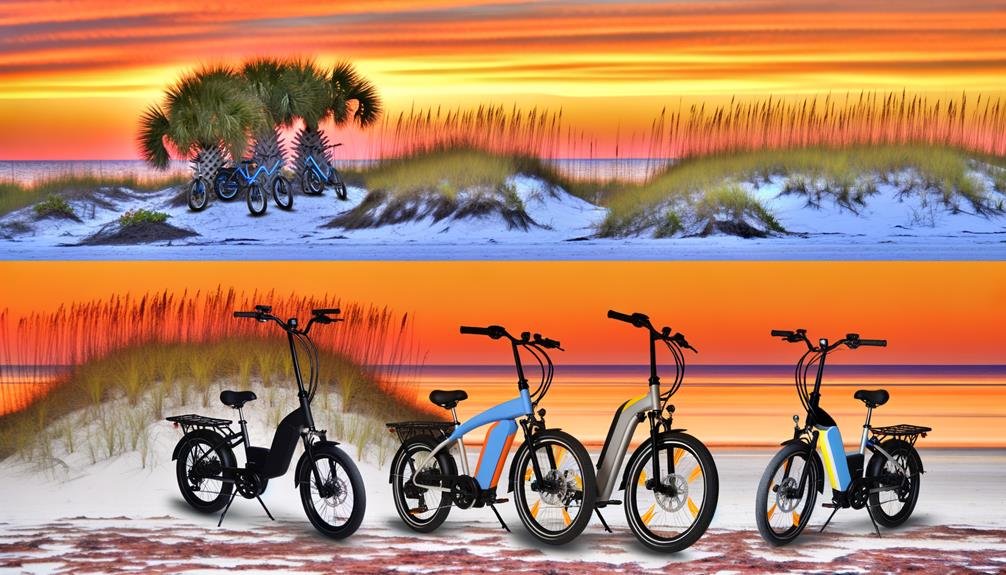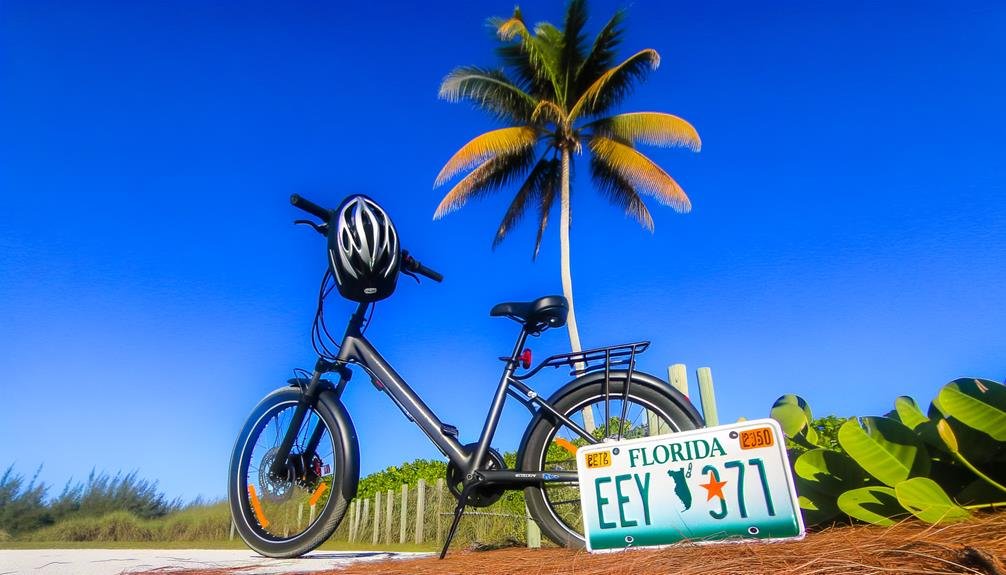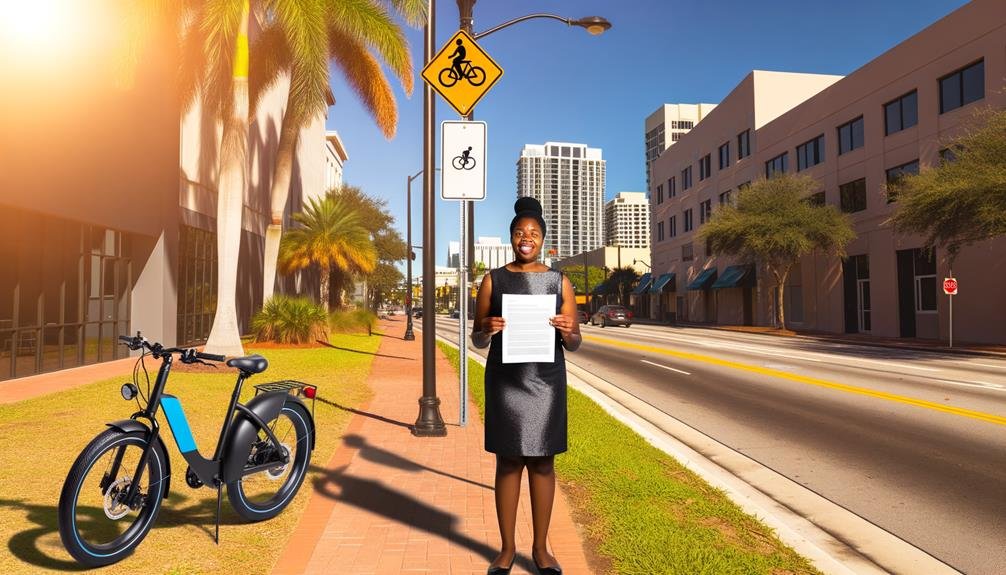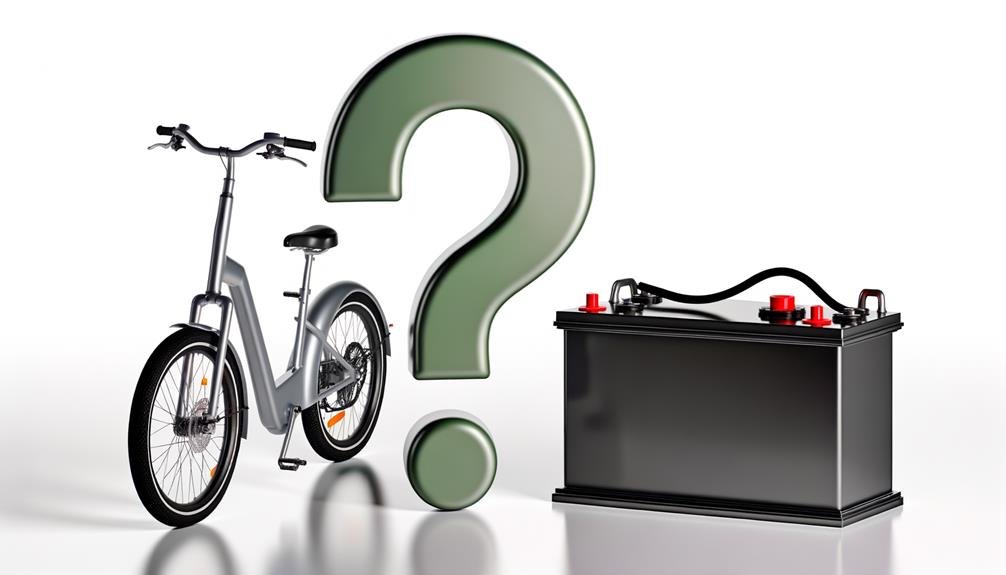Charles Miller is a veteran bike enthusiast with over 12 years of experience dealing with bikes as a mechanic. Despite immense love and expertise for...
Imagine the wind rushing past you as you effortlessly glide along Florida's sun-drenched coastline on your electric bike. You're enjoying the ride, but a question arises in your mind – are electric bikes even legal here?
It's a common query and one that carries some important implications. Florida's laws surrounding e-bikes can be complex and nuanced, which is why you need to understand them fully.
So, let's take a closer look, shall we?
Key Takeaways
- E-bikes are allowed in areas where standard bicycles are permitted, but there may be additional restrictions in state parks and local laws.
- Riders must be at least 16 years old to ride an e-bike in Florida, similar to the age requirement for driving a car.
- Florida has three classifications of e-bikes: Class 1, Class 2, and Class 3, each with different speed and pedal assist distinctions.
- E-bikes in Florida have regulated speed limits, with Class 1 and Class 2 limited to 20 mph and Class 3 allowed to reach up to 28 mph.
Understanding Florida's E-Bike Laws
In Florida, you're allowed to ride your e-bike wherever standard bikes are permitted, including roads, bike lanes, and multiuse paths. It's essential to keep in mind that some state parks and local laws may have additional restrictions. The Florida law is quite clear: Class 1 electric bikes, which are often the most common, are generally allowed in all areas where normal bicycles are permitted.
However, not all places in the Sunshine State are created equal. Some state parks in Florida may have their own set of rules regarding e-bikes. Before you set off on your two-wheeled electric adventure, make sure to check with the specific state park you're planning to visit.
The same goes for local laws. Some cities or counties might've additional restrictions or permissions for e-bike riding. It's important to stay informed and follow these laws to avoid any unexpected surprises.
In the state of Florida, the number 71 isn't just a highway. It's a reminder to always check local and state regulations before riding your e-bike. Ensuring you're in compliance with current Florida e-bike laws not only keeps you safe but also helps maintain a sense of belonging within the biking community.
Age Requirement for E-Bike Riders
If you're planning to ride an e-bike in Florida, remember that you must be at least 16 years old, a requirement similar to that of driving a car. This age requirement for e-bike riders is an important part of ensuring that you're in compliance with the law and prioritizing your own safety.
The Sunshine State takes the safety of e-bike riders seriously, and the age restriction reflects that. If you're under the age of 16, you shouldn't ride e-bikes on public roads or other designated areas. It's crucial to respect these rules not only for your own safety but also for the safety of others sharing the road with you.
Now, if you're a parent or guardian, it's your responsibility to make sure your children meet the age requirement before allowing them to ride an e-bike. Remember, electric bikes are powerful machines, especially Class 3 e-bikes, which are part of the three main classes of e-bikes.
Being an e-bike rider in the Sunshine State offers a lot of benefits, but it also comes with responsibilities. Always remember, the rules are there to keep everyone safe and to ensure a positive experience for all e-bike riders.
Classifications of Legal E-Bikes

In Florida, it's crucial to understand the classifications of legal e-bikes before hitting the road.
Each class, from Class 1 to Class 3, has its own speed and power regulations that you must adhere to.
Florida's E-Bike Classification System
You'll find that Florida's e-bike classification system includes Class 1, Class 2, and Class 3 e-bikes, each with unique speed and pedal assist distinctions. According to Florida statutes, these are categorized as follows:
- Class 1: This type of e-bike is equipped with an electric motor that provides assistance only when you're actively pedaling, and ceases once you reach 20 mph.
- Class 2: This e-bike has a throttle assist. It's designed to function even without pedaling but stops assisting when you hit 20 mph.
- Class 3: This class allows the electric bicycle to provide assistance up to 28 mph, but only with pedal action.
Understanding Legal E-Bikes
Navigating the legal landscape of e-bike riding in Florida, it's crucial to grasp that state law allows e-bike riders to use their vehicles wherever standard bikes are allowed, such as roads, bike lanes, and multiuse paths.
Now, you're probably wondering, 'Are electric bikes legal in Florida?' Yes, they are! However, understanding legal e-bikes involves knowing the specifics.
For instance, in Fort Myers and state parks like Alafia River State Park and Fort Clinch State Park, certain restrictions may apply. Therefore, it's essential to check with the specific park before hitting the trails.
Additionally, you might need specific insurance depending on local laws. Remember, being an informed rider ensures not only your safety but also respect for the e-bike community.
Regulating Speed and Power
When it comes to power and speed regulations, Florida acknowledges all classes of e-bikes, including Class 1, Class 2, and Class 3, but it's essential to ensure your ride fits within these legal classifications. Here's a breakdown:
- Class 1: These e-bikes are equipped with a motor that activates when the rider is pedaling, and they've a regulated top speed of 20 miles per hour.
- Class 2: This class also has a speed limit of 20 miles per hour, but the motor can work without pedaling.
- Class 3: These e-bikes can reach up to 28 miles per hour using a combination of human power and an electric motor.
Helmet and License Requirements

When it comes to helmet and license requirements for e-bikes in Florida, there's a bit you'll want to know.
You're not required to wear a helmet or have a driver's license, although a helmet is strongly advised for safety reasons.
It's also worth noting that local laws may have additional restrictions or permissions, so you'll want to check those before hitting the road.
Florida's Helmet Regulations
Ever wondered about helmet and license requirements for e-bikes in Florida? Let's dive into Florida's helmet regulations. While you're not required to wear a helmet when riding an e-bike, it's highly recommended for your safety. No driver's license is needed to ride, and registration or insurance for your bike isn't necessary.
Here are some key points to remember:
- No helmet is required, but it's safer to wear one when riding.
- No driver's license needed to ride an e-bike.
- No registration or insurance required for your e-bike.
E-Bike Licensing Laws
In Florida, you'll find that e-bike licensing laws are quite lenient, not requiring a driver's license, helmet, or registration, but there are key aspects to consider for your safety and legal compliance.
Unlike a traditional motor vehicle, the State doesn't require you to have insurance to ride an e-bike or meet any registration requirement. This leniency under the new law means you can easily enjoy e-bike use. However, this doesn't mean you should hit the road unprepared.
Although not legally required, wearing a helmet is highly recommended for your safety. Similarly, while a driver's license isn't mandatory to operate an e-bike, understanding road rules is crucial. Always stay informed and practice safe e-biking for a smoother ride in Florida.
Insurance Necessities for E-Bikes
Navigating the world of e-bike insurance in Florida, you'll find that it's not a legal requirement, nor do you need to register your e-bike. But that doesn't mean you should skip it. Here's why:
- Personal Protection: Even though e-bikes don't reach the same miles per hour as cars, riding can still lead to bicycle accidents. A personal injury lawyer will tell you, if you're involved in an accident, (PIP) insurance can help cover medical costs.
- Liability Coverage: While e-bikes require pedaling, they also pack power. If you collide with a pedestrian or another biker, you could be held responsible for their injuries.
- Theft and Damage: E-bikes aren't cheap. Protect your investment with coverage for theft or damage.
While insurance necessities for e-bikes aren't legally mandated, they're recommended. Florida law is clear – e-bikes are treated as bicycles, not motor vehicles. Still, be aware that local regulations may vary. Always check local rules before you ride.
Ultimately, insurance is about peace of mind. It's a small price to pay for the freedom and fun of e-biking in the Sunshine State.
Local Ordinances Regarding E-Bikes

You'll find that Florida's e-bike landscape allows riders to use their vehicles wherever standard bikes are permitted, such as roads, bike lanes, and multiuse paths. However, local governments can have their own rules about where e-bikes are allowed, so always check local ordinances to be sure.
For instance, some parks allow e-bikes, while others have banned e-bikes. At Myers Beach, miles of multiuse paths are open to all kinds of bikes. But remember, riders do not need to feel excluded. You're part of the biking community, regardless of your chosen ride.
Below is a table detailing more about e-bike laws in different Florida localities:
| Locality | E-Bike Laws |
|---|---|
| Myers Beach | All bikes allowed on multiuse paths |
| Some State Parks | E-bikes allowed |
| Other State Parks | E-bikes banned |
| General | Check local ordinances |
Keep in mind that this table is a general guide. Always check specific local regulations. So, enjoy the ride, but remember to stay informed, legal, and safe.
Frequently Asked Questions
Can You Ride an Electric Bike on the Road in Florida?
Yes, you can ride an electric bike on Florida roads, observing bike safety, speed limits, and riding regulations. Respect road restrictions, maintain your e-bike, follow traffic etiquette, wear protective gear, and use cycle lanes when available.
Do I Need a Licence for an Electric Bike in Florida?
No, you don't need a license for an e-bike in Florida. Age restrictions apply, you must be 16. There's no e-bike insurance necessary. Follow traffic rules, safety regulations, and adhere to helmet laws.
Are Electric Bikes Legal in Florida State Parks?
Yes, e-bikes are legal in Florida state parks. However, park regulations and e-bike restrictions may apply. Always follow trail etiquette, respect wildlife, and adhere to safety measures to ensure a great ride.
Are Motorized Bicycles Legal in Florida?
Yes, motorized bicycles are legal in Florida. You've to adhere to safety regulations, age restrictions, and bicycle lane laws. There's no need for bicycle registration, motorized bicycle insurance, or electric bike taxation.
Conclusion
So, you're all set to ride your e-bike in Florida! Don't let the lack of licensing or insurance requirements make you think it's less serious than driving a car. You still need to be at least 16 and it's smart to wear a helmet, even if it's not required by law.
Remember, local rules may vary, so check your area's ordinances.
Now, go enjoy the freedom and fun that comes with zipping around on your e-bike!

Charles Miller is a veteran bike enthusiast with over 12 years of experience dealing with bikes as a mechanic. Despite immense love and expertise for his Tacoma, he rides his Trek Ebike more. Anytime you meet him, you’ll either hear him talking about Bikes, or writing about all things bikes and cars on this blog.
More Posts


